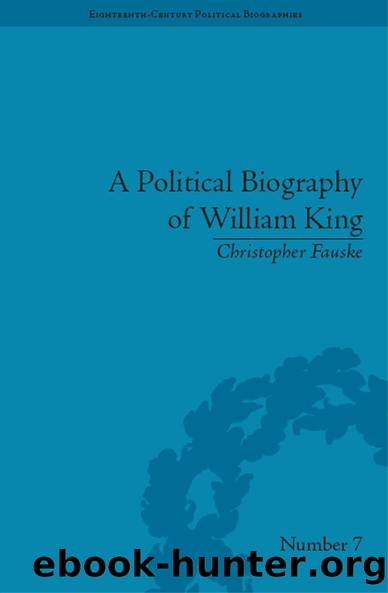A Political Biography of William King by Christopher Fauske

Author:Christopher Fauske [Fauske, Christopher]
Language: eng
Format: epub
Tags: History, Europe, Great Britain, General, Literary Criticism
ISBN: 9781317324195
Google: cPE5CgAAQBAJ
Publisher: Routledge
Published: 2015-10-06T16:10:59+00:00
5 FRUSTRATION
If Kingâs career as peer, landlord and disputant in Derry had been at times acrimonious, he at least had the comfort of knowing he was working in a region of strong Dissenter inclinations and where there was active correspondence with and travel to Scotland, from whence could come a variety of material and spiritual assistance.1 In his dealings with The Honourable the Irish Society, King was negotiating the minefield that was property law in a country where violence and counter-violence, regime change and restoration had served to complicate a terrain where surveying had often been rudimentary and where deeds, even had they had existed, had often been lost â as was the case with various of the deeds at the heart of the dispute over the bishopâs lands in Derry. In Dublin when the House of Lords was in session or when matters of state had taken him to the capital, King had been among like-minded companions more often than not. His conscience had been mightily troubled over the Treaty of Limerick and he had been heavily involved in the campaign against a toleration bill in 1692, but in both cases he had enjoyed the support of a significant number of fellow bishops and had earned the respect of even some of his opponents.
As Archbishop of Dublin, he would be more immediately engaged in domestic and IrishâEnglish relations, both as a result of his primacy and by virtue of proximity.2 The Irish parliament met infrequently, and oft en briefly, in the last years of the seventeenth century and in the first few of the eighteenth, and King had spent much of his time in his northern diocese overseeing the care of souls, the building of churches and the administration of those civic and ecclesiastical functions over which he had authority. A steady rise in the number of parishioners and in the number of services of Holy Communion demonstrated, at least to his eyes, that much of the attraction of the Dissenting churches in Ulster was a consequence of the lack of a forceful Church of Ireland presence attuned to local demands (mainly in matters of language and dialect). He set himself a demanding pace, reporting to the then-Archbishop of Dublin, Narcissus Marsh, that âI visited twenty one churches and confirmed in nine; it held me employed twenty three days. I ⦠prescribed penance to near an hundred people ⦠[and] have yet another circuit containing about thirteen churches and had one beforeâ.3 He was probably most gratified to be able to report that âI had great crowds of Dissenters everywhere and entertained them with a discourse, generally shewing the no-necessity of a separation on their own principlesâ.4 One suspects that, even allowing for shifts in the meaning of the word, Kingâs definition of âentertainedâ might not have been the same as that of his audience. Many of his tenants were Dissenters, or, at least, non-attendees at Church of Ireland services, and King had the ability as their landlord to require their presence when he was in their parish.
Download
This site does not store any files on its server. We only index and link to content provided by other sites. Please contact the content providers to delete copyright contents if any and email us, we'll remove relevant links or contents immediately.
Fanny Burney by Claire Harman(26603)
Empire of the Sikhs by Patwant Singh(23086)
Out of India by Michael Foss(16853)
Leonardo da Vinci by Walter Isaacson(13336)
Small Great Things by Jodi Picoult(7142)
The Six Wives Of Henry VIII (WOMEN IN HISTORY) by Fraser Antonia(5515)
The Wind in My Hair by Masih Alinejad(5095)
A Higher Loyalty: Truth, Lies, and Leadership by James Comey(4964)
The Crown by Robert Lacey(4817)
The Lonely City by Olivia Laing(4802)
Millionaire: The Philanderer, Gambler, and Duelist Who Invented Modern Finance by Janet Gleeson(4478)
The Iron Duke by The Iron Duke(4356)
Papillon (English) by Henri Charrière(4274)
Sticky Fingers by Joe Hagan(4198)
Joan of Arc by Mary Gordon(4110)
Alive: The Story of the Andes Survivors by Piers Paul Read(4033)
Stalin by Stephen Kotkin(3965)
Aleister Crowley: The Biography by Tobias Churton(3640)
Ants Among Elephants by Sujatha Gidla(3467)
